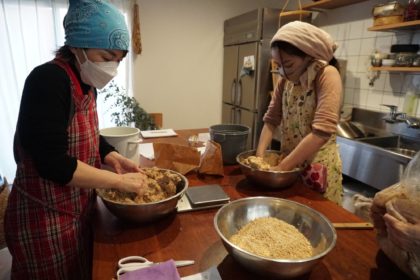
In Japan, more and more food producers are turning to fermentation as a cost-effective and nutritious way to give new life to food waste. It comes at a critical time, as the Japanese government has made an ambitious plan to halve food waste by 2030.
Fermentation has deep-rooted tradition in Japan, where kōji-based products like miso and sake were first made centuries ago (pictured, students in a miso class mix soybeans with kōji rice and salt). Japan Times outlines how Japanese producers are experimenting with fermentation to combat climate change:
- For example, multiple Japanese beermakers are using food scraps in their brewing. Chiba Upcycling Lab is using bread waste, Rise & Win brewery uses yuzu peel and Ashai uses spent coffee grounds.
- The Japan Food Ecology Center produces pig feed using lactic acid bacteria to ferment 39 metric tons of food scraps a day that come from 180 businesses.
- Tokyo-based Food Alchemist Lab is making plant-based salami using kōji, nuts and vegetable fibers, including juice production scraps.
Key is “combining ancient fermentation knowledge with novel approaches,” the article continues.
“Microorganisms have given us miso, sake and soy sauce. Now they can help save the planet,” says Tomas Linder, associate professor and senior lecturer in microbiology at the Swedish University of Agricultural Sciences in Uppsala.
Read more (Japan Times)
